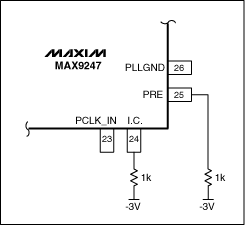
Overview of the MAX9247The MAX9247 is a 27-bit, 2.5MHz to 42MHz DC-balanced LVDS serializer. Intended for transmitTIng digital video in automoTIve applications, it converts three 6-bit words into a single LVDS data stream. This data stream is then deserialized by devices such as the MAX9218, MAX9248, or the MAX9250.
Enabling Test ModesThe first test mode generates a pseudorandom-binary-sequence (PRBS) data stream. In this mode, the external RGB inputs are ignored and can be tied high or low, or they can be left floating due to their internal pull-down resistors. The MAX9247 automatically generates an internal DE_IN signal. The DE_IN signal is asserted after 128 consecutive PRBS data words, inserting a transition word in the output data stream. The PRBS test mode is useful for generating an eye diagram on the receiving end; this eye diagram provides a quick qualitative analysis of the link integrity.
The second test mode generates an unencoded output data stream. In this mode, the external RGB inputs are transferred directly to their corresponding slot in the serial data stream with no encoding. The external RGB inputs can be driven with a data source, tied high or low, or left floating due to their internal pull-down resistors. The system must still generate its own periodic DE_IN signal to load transition words for proper operation. The unencoded test mode is useful for generating specific and predictable output data streams, such as those needed for worst-case EMC testing.
Both test modes are selected by pulling pin 24 (I.C.) and pin 25 (PRE) below ground. As Figure 1 illustrates, each pin must be current limited with a 1kΩ series resistor. A negative bias voltage of 3V is needed to ensure that the device enters test mode.

Figure 1. Two resistors bias the MAX9247 into test mode.
The two test modes are selected through active-low PWRDWN (see Table 1).
Table 1. Test Modes Selected Through Active-Low PWRDWN
欢迎分享,转载请注明来源:内存溢出

 微信扫一扫
微信扫一扫
 支付宝扫一扫
支付宝扫一扫
评论列表(0条)